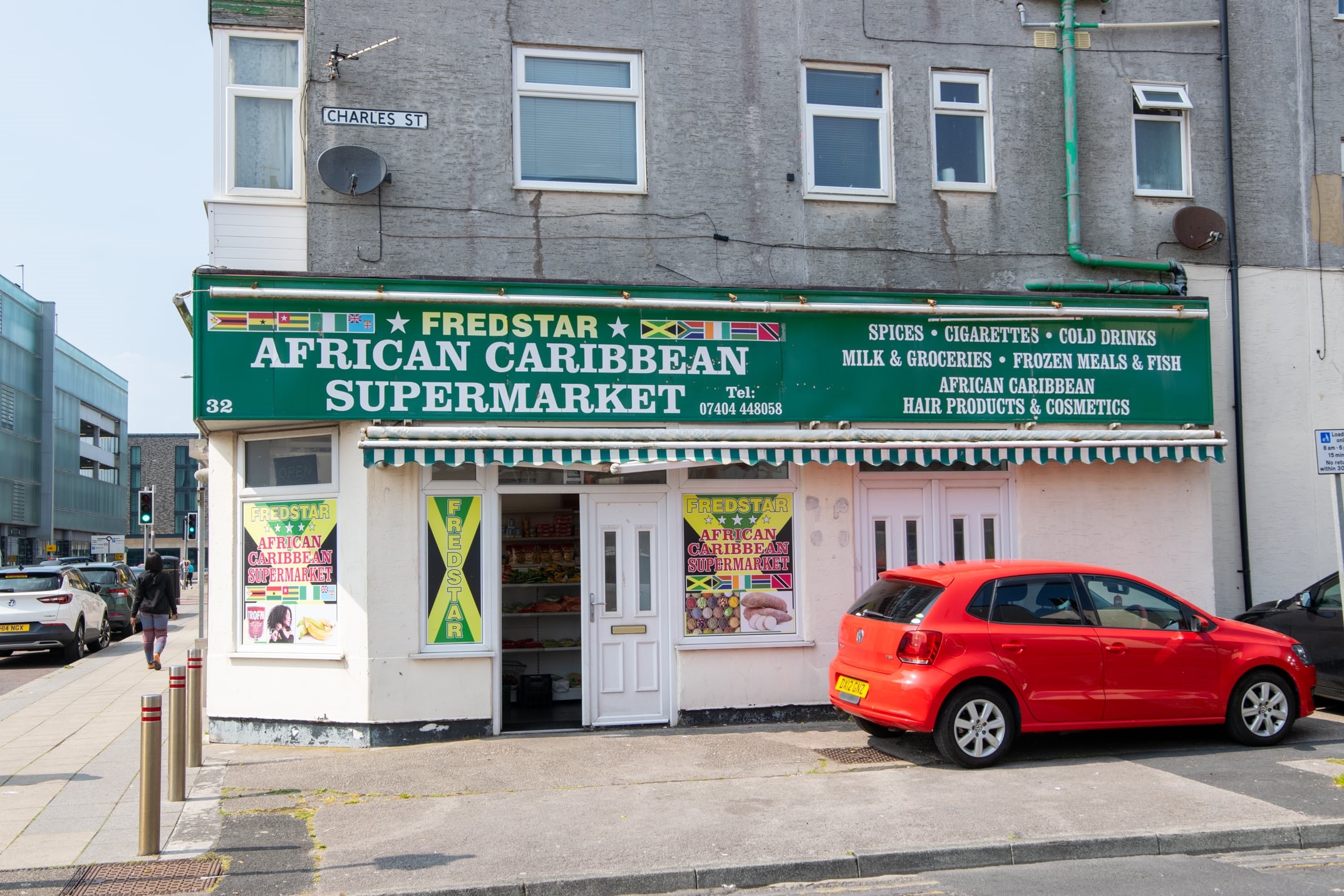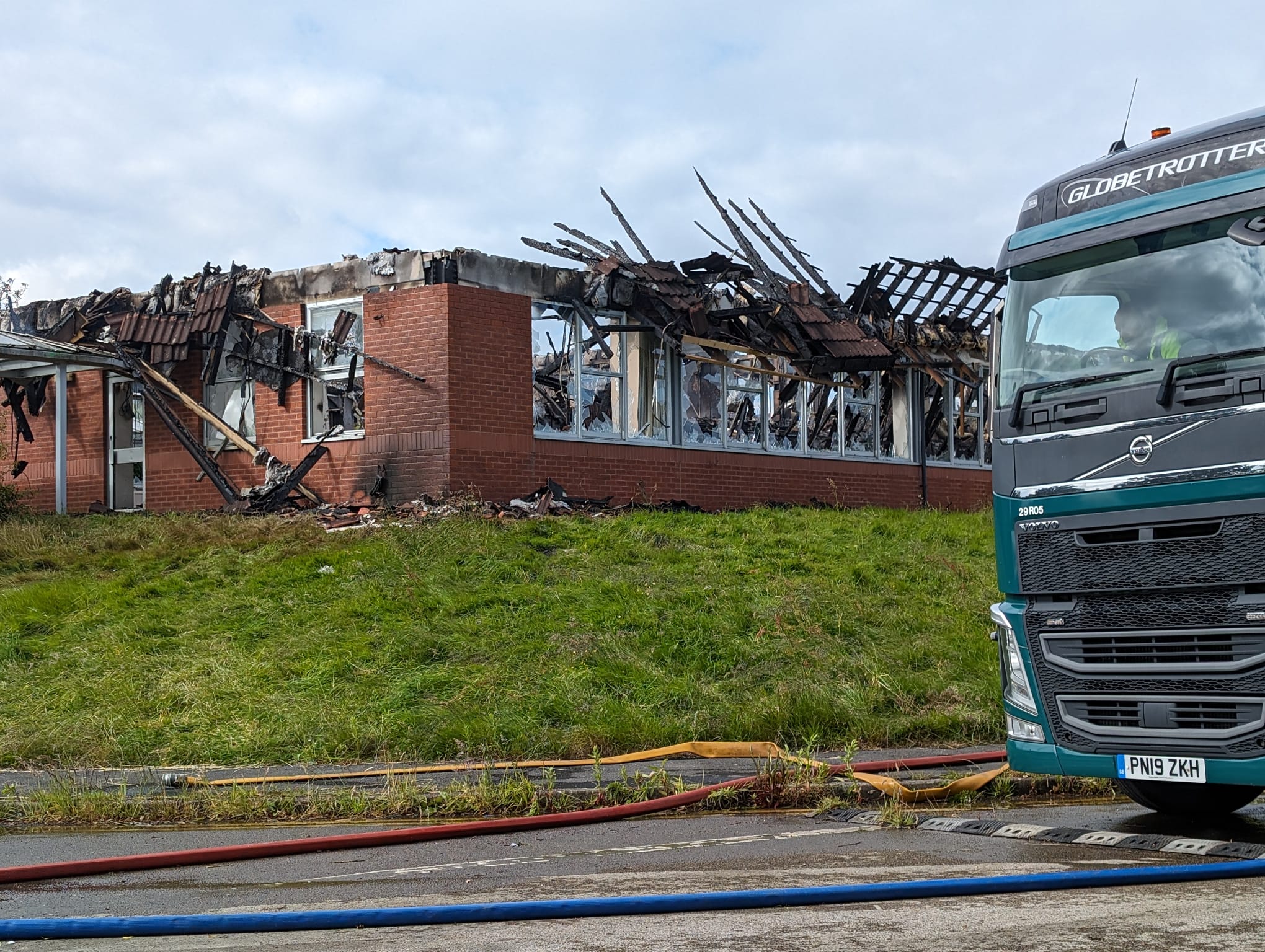Blackpool's Multiversity project risks pushing residents right to the edge
Residents living in some of the 72 properties set to be demolished speak with The Blackpool Lead about the harsh reality of the challenges they face as a direct result of the Multiversity project
When Peter Harris steps out of his Victorian ground-floor flat to go shopping with his oxygen tank in tow, he can either head across the road to Sainsbury’s or a short distance into the town centre to Iceland. The 68-year-old, who has the lung disease emphysema and uses a nasal cannula, can’t muster the energy for both in one day. His GP is only a short distance away, too, which is fortunate, because Harris, who also has prostate cancer, says he’s largely housebound now. “I can’t get out, really,” he said, describing his home in George Street as the perfect location for him.
His home gives an ageing, frail man some freedom, but it’s a freedom he now fears is being taken from him by council bosses, who sit in glass-fronted offices immediately opposite his living room, in which he also sleeps, to plot the compulsory purchase of his and dozens of other homes.
Finding somewhere else is, Harris feels, almost impossible, given he can’t manage stairs and, because he is constantly surrounded by potentially explosive oxygen tanks, doesn’t want to live anywhere with a naked flame, ruling out homes with gas boilers.
Speaking to The Blackpool Lead on Sunday morning from his armchair, surrounded by family photographs, medicine, paperwork and a small gift for “Dad, the man, the myth, the legend”, Harris, who lives alone, pleaded for more help from the council and asked: “Where am I going to go?”
He said: “I need help. If I don’t get it, they will stick me in a home. They will put me in a corner and forget about me.”
And what then? Harris hesitates, looks out of his bay window at the blue sky, and doesn’t answer.
His story is one of several shared with The Blackpool Lead by residents living in some of the 72 properties set to be demolished - subject to a public inquiry ordered by the government - to make way for Blackpool’s £65m Multiversity.
Around 60% of the 60 two-and-three-storey residential properties - some of which have been divided into flats - and 12 businesses have been sold or are in the process of being sold.
Talks are under way with the remaining 40%.
If the inquiry goes in the council’s favour, those continuing to live on the square parcel of land, between Cookson Street, Milbourne Street, George Street and Grosvenor Street, right next to the town centre and within the Talbot Gateway development area, will be turfed out, against their will if necessary, by way of compulsory purchase order (CPO).
George Whyte, 52, an unemployed engineer who says he has worked in the nuclear and aerospace industries, has lived at his George Street home since birth.
Inheriting the house from his mother “10 to 15 years ago”, he now faces the prospect of his childhood home, complete with decades of memories and milestones, being turned to dust.
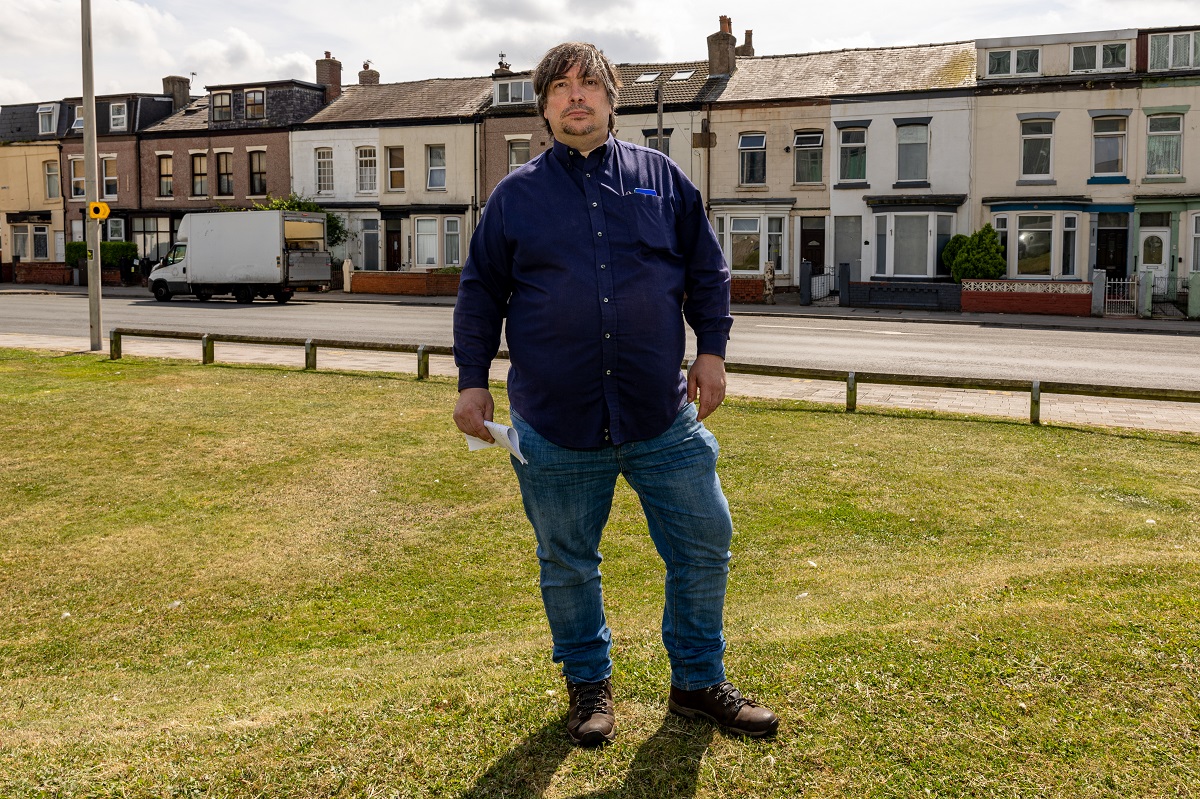
George Whyte in front of George Street homes set to be demolished to make way for a new education campus. Credit: The Blackpool Lead/Michael Holmes
While he doesn’t disagree with the idea of a new education campus on his doorstep, he believes there are more suitable sites nearby and is unhappy at the way the council has acted, accusing the authority of putting letters through letterboxes saying “‘we will give you £80,000 for your house’. They said, ‘If you don’t take it, there will be a CPO’.”
He added: “They are acting like the worst property developer.”
Stepping in to advise other residents struggling to navigate the CPO process, Whyte said it’s a “good, neighbourly thing to do”, adding: “It’s my community.”
He worries that one neighbour recently admitted to hospital, an older man with heart issues, had his condition exacerbated by stress, and that others will end up dead or on the street.
Kevin Butcher, 54, who has lived in a ground-floor flat in George Street since 2019, said he learned of the CPO threat from a neighbour and said the anxiety has impacted his health.
“My head just exploded. Just, ‘Wow’,” he said from his front yard wall while stroking his Staffordshire bull terrier, Rico, 10. “I don’t want to go backwards in life, I want to go forwards.”
Butcher said he has also struggled to find somewhere else to live and believes the council could and should do more to help.
With arthritis in his knees, he is looking for a ground-floor home - in a like-for-like neighbourhood - owned by a landlord who will allow his dog - his “support” who he credits with saving his life - to stay.
Although far from perfect, with a leaky ceiling, Butcher’s home provides stability, he said, growing emotional when asked about a wall drawing of his brother, who died last year.
Are you enjoying The Blackpool Lead's in-depth reporting on your town? Help us continue to provide ad-free news with a £5 monthly subscription.

Kevin Butcher and his dog Rico in Charles Street. Credit: The Blackpool Lead/Michael Holmes
Asked what he wants, Butcher said “peace - peace of mind and of heart” but was more downbeat about what the future holds.
“What future?” he said. “It’s like my life is standing still. It’s hell.”
Robert Farrell, 79, who owns two properties in George Street divided into 11 flats, including one rented to Harris, said he also believes the stress of the proposed CPO has affected his health, telling The Lead: “My heart was in A1 condition and now I have to take tablets.”
He said the council has treated property owners and residents “like dirt”.
“I have been treated without respect,” he said. “(The tenants) are upset. They are all on edge.”
Irishman Farrell, who asked to be described as a “property owner” rather than landlord and who lives in the same street as his tenants, who tend to be older than 50, said his main concern is their wellbeing.
“If we can’t get these guys sorted, they will float out into the distance,” he said.
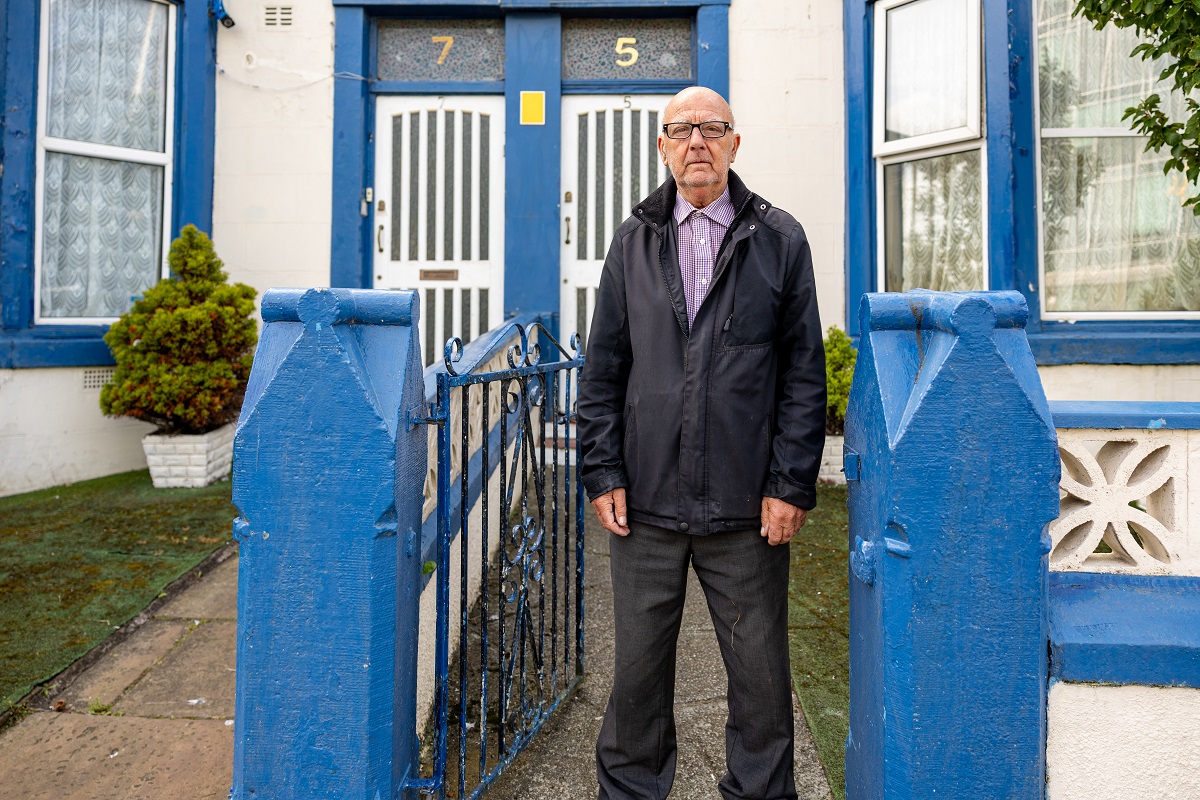
Property owner Robert Farrell outside the two George Street properties he rents out to a number of people. Credit: The Blackpool Lead/Michael Holmes
Council leader Cllr Lynn Williams said she “can’t discuss the detailed support we have provided for each individual resident or comment on individual cases” but understands “very clearly” that buying people’s homes and “asking them to move” is “an emotional and disruptive process”.
She said in a statement: “We have regularly written to every property owner and directly to tenants in the impacted homes over the last two years, updating them of the process throughout and letting them know that we have set up a special advice service to help them if they are struggling to find somewhere new to live.
“We have worked really hard to ensure that everyone affected has received information from us before it has been in the public domain and in the papers, and if people feel we have not managed this for everyone, I am sorry.
“Since we started working to share the plans with residents and businesses in the affected area, many residents have found new properties without needing very much assistance from the council, having accessed the compensation that they have been entitled to purchase a new home, or to find a new tenancy.
“Some residents have needed some more focused support and have been assisted by the Infusion Service. They have helped people to access tailored housing advice, supported people to understand and access advanced payments when this has been helpful in the move on process for them and advocated for residents to ensure that completion dates support their move when this has been appropriate.
“During this work, a number of people who have been living in poor quality rented accommodation who did not know how to access support to change their living conditions have been helped and have told us that the support from the team has been really valued. We continue to offer this service to everyone affected by the development and are happy to hear from anyone who would welcome more support.”
The local authority believes the homes, some of which date back to the 1860s and, according to Farrell, used to be owned by the wealthy and also house servants, should be replaced by a “world-class university experience” capable of teaching more than 70 courses to a total of 3,600 students.
Williams said “huge sums” are being spent on regenerating Blackpool and to “make it better for everybody”, with much of the cash aimed at the Talbot Gateway.
“A vibrant, thriving town centre needs people - visitors coming for a variety of reasons,” she told The Blackpool Lead. “We continue to see our tourism offer delivering day and stay visits to our attractions and the surrounding businesses, but we need not to rely solely on tourism to keep our town centre alive.
“The Talbot Gateway programme of work will bring more than 8,000 workers and students into the town centre, as well as improving transport with the new tram extension, and creating community assets such as new shops and green areas.”
Documents say the project, funded in part by a government grant, would be “underpinned by six … key objectives: injection of a new life into the heart of Blackpool; embed holistically into the town centre; allow people to upskill through life; raise the college profile in the town and beyond; create an iconic building that sings Blackpool; and increase footfall in the town centre to encourage regeneration”.
Four people objected to plans for the scheme, which include proposals for a plaza that would “form new connections into the town” and create “spaces to pause, meet and socialise”, while 13 objected to the CPO, triggering the inquiry, which will be held over two weeks in November and December.
In his objection to the plans, Whyte said then-Blackpool South MP Scott Benton, who lost his seat to Labour’s Chris Webb in a recent byelection, at a public meeting considered a “location close to Blackpool South train station a more holistic and valuable location for the Multiversity project”.
Whyte wrote: “It was unfortunate that Blackpool Council did not attend to hear the local community’s concerns.”
He also highlighted a number of locations on his doorstep that he believes would be more suitable, including land between The Hop Inn in King Street and the Stanley Buildings in Caunce Street, the former Syndicate nightclub site in Church Street, and a car park opposite The Regent, also in Church Street.
“I’m not saying not in my backyard,” Whyte told The Blackpool Lead. “(But) you have three alternate sites.”
Webb said that he, too, supports plans for the campus but welcomed the public inquiry, insisting that “progress for Blackpool should mean progress for all and it’s vital the people impacted by this development get the best possible outcomes”.
He added: “They must be enabled to get new homes and business premises of the equivalent or better standard and their needs must be the council’s first priority.”
The Blackpool Lead also visited the four-acre site on a drizzly evening last week, when the grey security screens fixed to the doors and windows of empty properties matched the colour of the sky.
Some front gardens had become overgrown and were filled with bags of rubble, windows were smashed on half-boarded up former guest houses, and furniture sat abandoned in the yard of a home once called Sunnyside.
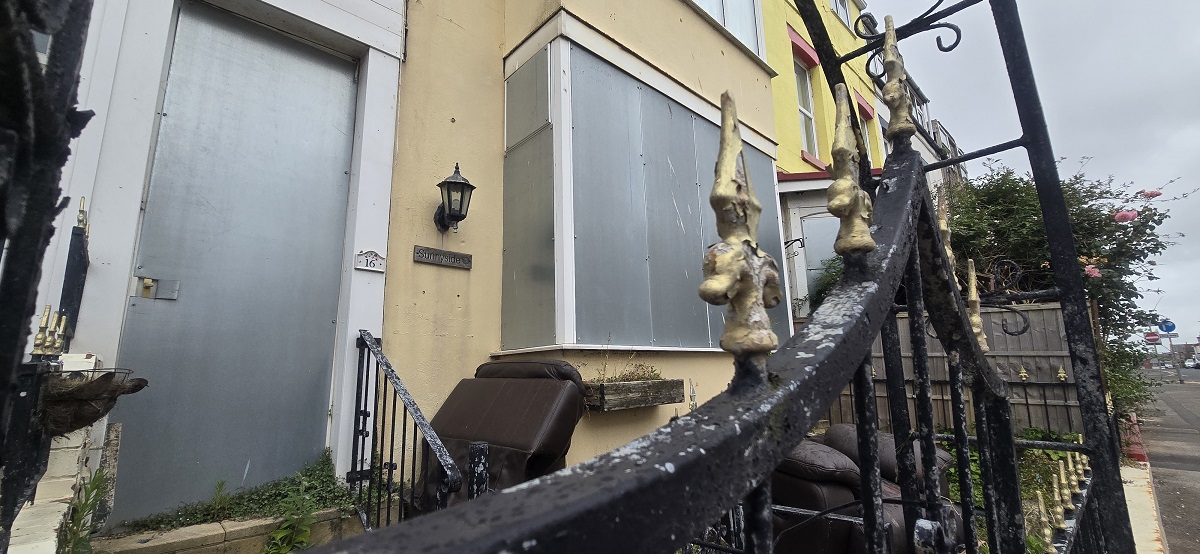
Furniture in the front yard of Sunnyside in Charles Street. Credit: The Blackpool Lead/Michael Holmes
That five-bedroom property, at 16 Charles Street, sold last April for £98,000, according to property website themovemarket.com. Months earlier, the council had agreed to buy the terraced home, which had previously been sold for £85,000 in 2015.
Pictures of the inside show that the forgotten dwelling had once been cosy and cared for.
The idea that the rows of properties, once freshly painted in gentle pastel colours but some now increasingly dirty and faded, could soon be replaced by a modern further education campus, and that hundreds of hopeful students could soon be walking leisurely across a pedestrianised George Street with textbooks and laptop computers in their arms, still seemed a long way from reality.
There is a consensus that the rot has set in - with accusations that it has been allowed to.
“Whilst there are some positive examples of late-19th century buildings of modest architectural interest along Cookson Street, the wider character area displays a degree of dilapidation through a lack of investment, subsequently resulting in a poor pedestrian environment,” a heritage statement filed with the council said.
But that lack of investment is partly down to authority chiefs, said one neighbour, who lives in Milbourne Street in a house set to be overlooked by the new development.
He said a report branding the area “rundown” and “unattractive” certainly “covers the neglected state of the area”, but argued that the “council has made no effort to have this remedied under its existing and expanded powers”.
The man, who also voiced concerns that the university buildings would tower over nearby homes, said several planning bids to carry out work on houses in the development area over the years have been rejected.
He claimed: “Combining the above observation and that Blackpool Council had an agreement … to build a new further education site jointly through application of central government funding before any of the properties in the proposed site were purchased seems like a premeditated obstruction to maintaining the properties in the area as residential dwellings.”
Whyte said the council has “managed the decline” and pointed, as an example, to a pile of old, broken furniture, including dirty mattresses, left in the back garden of an empty house now thought to be owned by the council.
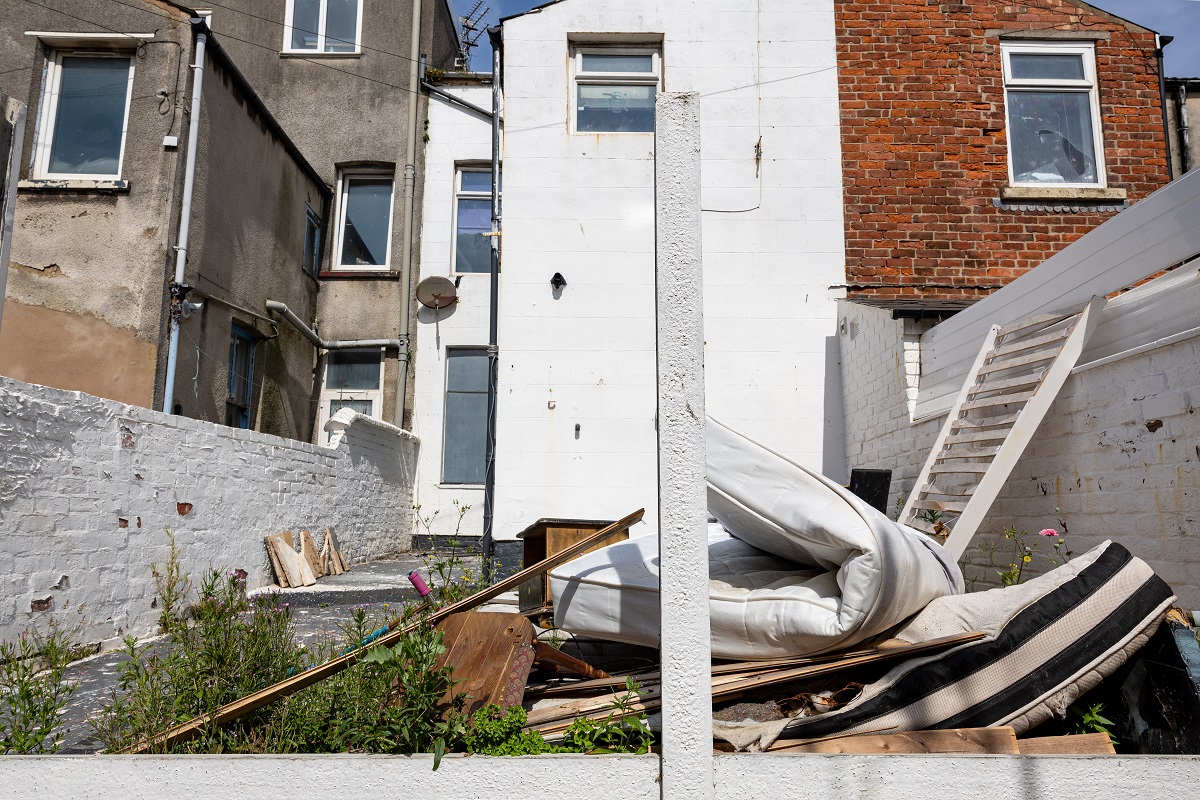
Furniture left in the back yard of a George Street home believed to now belong to the council. Credit: The Blackpool Lead/Michael Holmes
Williams, the council leader, said Blackpool’s “social problems … especially around the town centre are well recorded” and to “break that cycle of deprivation we need radical, creative development to create new jobs and improve opportunities for local people and to attract further confidence and investment”.
She said: “Sadly, and unavoidably, that does mean that some areas will need demolishing and rebuilding, but we are very conscious that we support the local residents who are impacted as much as we can.”
She continued: “We are confident that this was the right, and only, choice in delivering the transformative change to the area that the Multiversity will bring. The college requires a town centre location. After extensive and exhaustive work by the council, the college and external consultants, this site was selected as the most suitable due to its proximity to key public transport, town centre facilities and having the physical capacity and size to fulfill the ambitions of the Multiversity.”
The Multiversity - given its comicbook-like name because it would be “multi-functional” and “multi-layered” - would be England’s first carbon-neutral higher education campus. It would replace Blackpool And The Fylde College’s University Centre in Park Road, central Blackpool, including the Palatine Road arts college, whose future is unknown.
Concerns about its proposed new home have also been voiced by local businesses.
Fred Omasan, 49, who runs Cookson Street’s Fredstar Afrocaribbean supermarket, which advertises African-Caribbean hair products and cosmetics, spices, groceries and other products, previously told The Blackpool Lead: “We have to move out but we haven’t got a location yet. This is going to kill my business off.”
Omasan said he understands the need for a CPO but is unable to negotiate terms with the council because he is only a tenant.
“The landlord is obviously concerned about what he will get out of it,” he said. “I am just in limbo; I don’t know who to speak to about it now.
“Surely someone can give me some money to move? For me to move my shop, including the signage, it will cost no less than £10,000. Everywhere around here now is so pricey. I don’t know if I will be able to afford the new rent. If I go further into the outskirts of Blackpool then that will affect trade.
“I honestly don’t know whether this will be the end of my business.”
Omasan’s landlord, Lee Dribben, who has reduced Fredstar’s rent, admitted that if he was a “commercial tenant I would be looking for alternative premises”.
He added: “If Blackpool wants to progress, it needs to knock down buildings. If that’s by CPO, then so be it, but I wish the council was more considerate towards tenants.”
The council said previously that it continues to “support any residents or tenants who have to move as a result, and nobody will be asked to move without reasonable warning”.

George Whyte inspects council documents relating to the CPO. Credit: The Blackpool Lead/Michael Holmes
It said: “While we cannot go into the detail of individual negotiations, these have to take place with the landowner at first. While we’d expect the landlord to update their tenant as per any landlord-and-tenant agreement, due to the nature of the scheme we have also regularly written to all tenants in the affected area explaining the process and what advice and support is available to them before, during and after the completion of the sale.”
A council consultation on the Multiversity project ran from October 24 to November 6 last year, with 2,166 leaflets put through letterboxes in the area. A dedicated consultation webpage also went live.
Just 23 responses were received, with 15 people “very supportive” or “somewhat supportive” of the scheme, two “neither supportive or unsupportive”, and six “somewhat supportive or unsupportive”.
Those in favour said a campus near the town centre would be a boost for the resort, bringing jobs and courses while improving the area.
Those against said the development isn’t needed, compensation to the existing property owners is insufficient and other sites are more suitable.
There's lots of ways you can support our work as The Blackpool Lead, from a one-off donation, to a monthly payment through to shopping for The Lead branded merchandise too. It all helps support our independent, in-depth, journalism.
Unpicking the Multiversity
Blackpool And The Fylde College’s website said the Multiversity is due to open by September 2027.
Whyte believes the public inquiry into the CPO process could delay the project by at least a year, at a cost of millions of pounds.
A town hall insider said, however, that such a challenge was expected and factored into the original timescale.
Work on the Talbot Gateway has been hit by significant setbacks before.
Phase one of the £350m masterplan was the building of Sainsbury’s and Bickerstaffe House, which houses the council; phase two was the tramway extension and Holiday Inn, which opened this summer, years behind schedule; and phase three was the redevelopment of The Hop Inn, now a dental practice, and the building next door of new offices, due to open in March, for the Department of Work and Pensions.
The Multiversity is the fourth phase.
Council documents from 2006 outlining long-term hopes for the area said: “By 2020, it is anticipated that Talbot Gateway will provide a stimulating arrival experience that provides an exciting new northern anchor for the town centre.
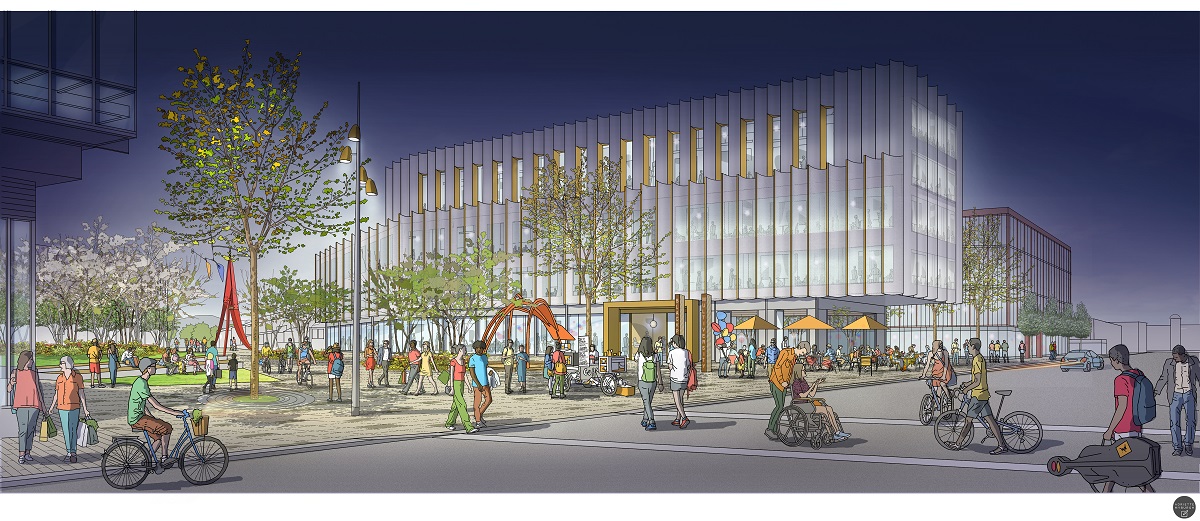
An artist's impression of the new further education campus
“It will be a cosmopolitan area of mixed uses that provides seamless integration with the centre. Major redevelopment that includes a new public transportation interchange around a remodelled station, new council offices, new courts and public space will have created a civil focus for Blackpool and Fylde residents.”
The 82-page report, now 18 years old, even then described the “Cookson Street area” as having a “degree of dilapidation through a lack of investment”.
It did not talk of plans for a university or even contain the word “education”.
It did say, however: “Careful consideration will be needed in the redevelopment of this area so that the general form, rhythm and active frontage character of the prevailing streetscene is maintained within any redevelopment to maintain the general scale and balance of the streetscene.”
A new magistrates’ court building is now due to be built half a mile away, on the site of the old Devonshire Road hospital at the junction with Talbot Road.
The Blackpool Lead is now on Substack.
Become a Member, and get our most groundbreaking content first. Become a Founder, and join the newsroom’s internal conversation - meet the writers, the editors and more.


